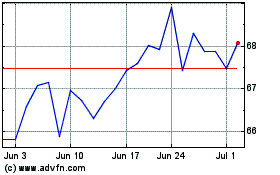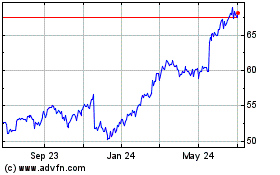By Aaron Tilley
The Trump administration's campaign to make Chinese-owned
video-sharing app TikTok relocate to the U.S. is the latest example
of the global fracturing of the internet.
President Trump over the weekend approved in principle a deal
that would shift TikTok's headquarters and data to the U.S. Chinese
owner ByteDance Ltd. and its investors, for now, remain the
majority shareholder, with Oracle Corp. taking a 12.5% stake in the
new company, called TikTok Global, and Walmart Inc. owning 7.5%.
Oracle will serve as a technology partner to assure the U.S.
government that user data is safe, the companies have said.
With the move against TikTok, the U.S., in effect, is following
steps a number of other governments have taken to treat their
citizens' data as a national-security issue and impose restrictions
on how data is stored and shared. Mr. Trump raised concerns that
China's government could tap TikTok's data on American users
because the app is Chinese-owned. TikTok has said it wouldn't share
the information.
Treating user data as a matter of national security is a notion
that has dictated many of the policies Beijing has put in place to
control the internet in its country for the past decade. China
operates what is called the "Great Firewall," limiting the services
people in the country can use and the information they receive.
Beijing stops people from accessing services run by FacebookInc.
and Alphabet Inc.'s Google, instead steering them toward
Chinese-owned alternatives such as WeChat and Baidu Inc. that it
controls increasingly tightly.
The idea that those data flows need tighter control has spread
in recent years, resulting in a number of instances when
governments temporarily shut down the internet. Governments have a
range of motivations, from squelching internal dissent to
protecting their citizens' privacy.
The European Union, which put in place strict conditions on
overseas data transfers two decades ago, has broadly tightened its
safeguards for its residents' information with its General Data
Protection Regulation. India has followed, erecting roadblocks
through special requirements for how U.S. tech companies structure
their operations and handle data collected from Indian customers.
India this summer also banned dozens of Chinese apps, citing
national-security concerns, amid a lethal border skirmish with
China.
Those measures can come with high costs for tech companies, many
based in the U.S. and China, that are built on an internet with few
borders. Google pulled out of China a decade ago, losing access to
the vast market. Facebook, blocked in China, could face a potential
multibillion-dollar fine in Europe over its data practices.
Microsoft Corp., which also vied for TikTok, in China limits
content on its Bing search engine and LinkedIn business-focus
social-networking site.
"U.S. tech companies have far more to lose if this becomes a
precedent," said Aaron Levie, chief executive of Redwood City,
Calif.-based Box Inc., a fast-growing cloud-computing company.
"This creates a Balkanization of the internet and the risk of
breaking the power of the internet as one platform."
Some U.S. lawmakers, for some time, have urged the government to
retaliate for China's efforts to exert control over the internet.
Even before the U.S. took steps to force changes around TikTok's
data, U.S. national-security officials ordered another Chinese
company to sell gay-dating app Grindr, citing the risk that the
personal data it collects could be exploited by Beijing to
blackmail individuals with security clearances, according to people
familiar with the situation.
The drama around TikTok and its 100 million American users was
far higher, though, with President Trump threatening to shut down
the app absent a sale. By targeting TikTok as well as WeChat, the
ubiquitous-in-China messaging and payments app owned by Tencent
Holdings Ltd., Washington has effectively enacted measures to
create data-privacy rules, but in a way that can be difficult for
companies to handle, said Paul Triolo, head of the global
technology policy practice at Eurasia Group, a political-risk
consulting firm.
"With these actions, the U.S. is basically making up a rule that
no Chinese person or government can have access to the data of a
U.S. citizen," Mr. Triolo said. But, he said, "trying to set up a
data-protection regime using executive orders is really messy, as
this whole thing is turning out to be."
Adam Mosseri, chief executive of Facebook's Instagram, tweeted
on Friday that a U.S. ban on TikTok "would be quite bad for
Instagram, Facebook, and the internet more broadly."
It isn't just the U.S. and China that eye each other with
distrust. The European Union's top court in July struck down one of
the main legal mechanisms companies use to store information about
EU residents on U.S. servers, arguing that such transfers exposed
Europeans to American government surveillance without "actionable
rights" to challenge it. The ruling also restricted another legal
mechanism companies had used as a backup, leading an EU privacy
regulator to start the process of ordering Facebook to cut off
EU-U.S. personal-data flows, which the company is appealing. The
legal challenge that spurred the July ruling dates to the 2013
leaks of alleged U.S. surveillance practices revealed by former
National Security Agency contractor Edward Snowden that showed some
U.S. companies were sharing user information with the
government.
U.S. concerns about China have increased in recent years, in
part driven by the massive hack of records held by the Office of
Personnel Management in 2015 that exposed sensitive data on
millions of Americans. The U.S. suspected China was behind the
attack, which Beijing denied.
The U.S. action on TikTok has enraged the Chinese government.
"Without any evidence, they have been abusing national power under
the pretext of national security to suppress and coerce
non-American companies that have a cutting edge of a particular
field," said Wang Wenbin, a spokesman for the Chinese Foreign
Ministry, last week.
The Trump administration also said it was moving against TikTok
to keep Americans safe from online misinformation, an argument
defenders of China's heavy-handed approach to controlling access to
online content in defense of the country's policies also put
forward.
To help address those concerns, TikTok Global won't just have
U.S. investors, but four of its five board members will be
American.
That construct could be a useful precedent for other companies
as they try to determine what arrangements may be acceptable to
Washington, said Winston Wenyan Ma, formerly a managing director at
China Investment Corp., the country's sovereign-wealth fund, and
now an adjunct professor at New York University's School of
Law.
But the TikTok situation that still has many unanswered
questions isn't likely to resolve all uncertainties, he said. "In
this new world, one case can't solve everything."
--For more WSJ Technology analysis, reviews, advice and
headlines, sign up for our weekly newsletter.
Stu Woo contributed to this article.
Write to Aaron Tilley at aaron.tilley@wsj.com
(END) Dow Jones Newswires
September 21, 2020 08:14 ET (12:14 GMT)
Copyright (c) 2020 Dow Jones & Company, Inc.
Walmart (NYSE:WMT)
Historical Stock Chart
From Mar 2024 to Apr 2024

Walmart (NYSE:WMT)
Historical Stock Chart
From Apr 2023 to Apr 2024
